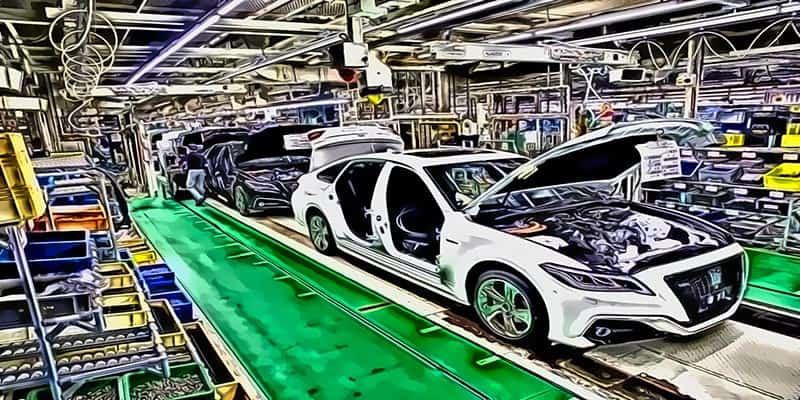Toyota has announced that it will reduce its vehicle production by 40% in September due to a worldwide microchip shortage.
Toyota had originally planned on making 900,000 vehicles next month; however, they have since cut that number down to 540,000 vehicles.
Volkswagen has warned that it may also have to cut production further.
The Covid pandemic has led to an increase in demand for appliances that use chips, such as mobile phones, TVs and games consoles.
Volkswagen, the German firm that reduced production earlier this year, told Reuters on Thursday: “We can’t rule out further changes to production, we currently expect supply of chips in the third quarter to be very volatile and tight”.
The automotive industry is being hit hard by the global chip shortage which has led to production cuts from competitors such as General Motors, Ford, Nissan and Daimler. However, Toyota was able to dodge this bullet until now with the exception of extending summer shutdowns by a week in France, the Czech Republic and Turkey.
New cars are now more like computers than a machine, and often include dozens of microchips.
Toyota benefited from having built a large stockpile of chips as part of a revamp to its business continuity plan, developed in the wake of the Fukushima earthquake and tsunami a decade ago; however, the decision to reduce output now has been precipitated by the resurgence of coronavirus cases across Asia hitting supplies.
The company announced it will make cuts in August at its plants around Japan and elsewhere. The bulk of these reductions – 360,000, will happen this September with factories affected across Asia and the US.
Toyota is doing everything they can to ensure their international businesses are not negatively impacted by the global shortage of semi-conductor supplies.
Toyota has two plants in the UK, a car plant at Burnaston, Derbyshire, and an engine plant in Deeside Wales.
In a statement, it said: “Toyota is going to great lengths to minimise the impact of the semi-conductor supply shortage that is globally impacting the automotive industry”.
“In terms of our UK production operations, we are currently operating as planned at both plants”.

The aim for Toyota as a whole is to make up for any lost volume by the end of 2021.
Many companies are being negatively affected by the chip shortage, including car makers and small appliance manufacturers. Apple was forced to stagger their iPhone release last year and Xbox and PlayStation consoles failed to meet demand.
After the recent announcements, it seems that one technology company after another is warning of a potential chip crisis. Intel CEO Pat Gelsinger, said the worst of the global chip crisis was yet to come.
Mr Gelsinger predicted the shortage would get worse in the “second half of this year” and it would be “a year or two” before supplies returned to normal.
The shortage of chips across the US has prompted a response from President Joe Biden. He signed an executive order to address this issue and vowed to seek $37 billion in funding for legislation that would increase chip manufacturing in the country.
Toyota shares plummeted by 4.4% on Thursday, their biggest drop since December 2018.







